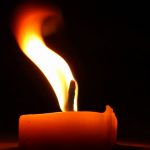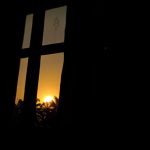
REMEMBERING THE DEAD
after four years
of my grandfather’s death,
my father plants a flower in
his memory at the facade
of our house. This is how to
remember the dead, he says,
his heart enamored by the
ache of watching how every
day leaves without his father’s
letter in the mailbox,
without his father’s voice
over the phone, stretching
his love to his son.
Sometimes I imagine how it
feels to lose a beloved to death,
how my father straps courage
to his heart despite the longing
for his dead father, how every
night he enters his father’s room
to meet
old newspapers, his toothbrush
wrapped in dust, his slippers
abandoned at a corner,
his wristwatch on the TV,
his stereo on the shelf,
everything that remains
the evidence of the
memories of his
spent life
SOMETIMES WHEN BOMBS EXPLODE
My father orders us to kneel
on the floor of our room,
our hand stretched out
like the bowl of a beggar
waiting to feel alm dropped
inside it, our lips whispering
Yah Allah as smoke darkens
the sky.
In other houses, the children
will scream and
their mothers, their hearts
heightened by the blasts,
will shiver.
Sometimes my mother tiptoes
to where the door struggles to
remain unbroken by the rapid
bullets, to where my father stands,
pretending to remain unmoved
by the footsteps of people
running for their lives.
Sometimes when the bombs explode
we remain frozen, fixed
to our beds, afraid to look
outside through the keyhole,
scared of hearing the cracks
of our walls, terrified by how
quick we surrender to the fate
of dying, of becoming listed
as victims of blasts,
of watching our lives
vanish in the smoke of bombs.
HOW WE BURY OUR DEAD
Sometimes we sort them
before burying them:
Hazim, killed by bombs,
age 23, Rukia, 19, her dead
body found in bed,
her unclaimed body
at a morgue, Hazia,
12, buried in a mass grave,
her mother the forlorn
woman grieving all day.
Hanthan, 18, his dead
body buried under the
rubble. Adiza, 13, her body
reeking of gasoline, her
shredded cloth littering
the venue of the blasts.
Hadim, 23, his body
drilled by bullets.
Rheya, 40, dead
by bullets, her blood
thickening the soil,
her cold hands folded.
About the Author
 Rasaq Malik is a graduate of the University of Ibadan. His poems have been published in Rattle, New Orleans Review, Spillway, Poet Lore, Michigan Quaterly Review, Minnesota Review, and elsewhere.
Rasaq Malik is a graduate of the University of Ibadan. His poems have been published in Rattle, New Orleans Review, Spillway, Poet Lore, Michigan Quaterly Review, Minnesota Review, and elsewhere.




Characteristic Rasaq.
Rasak does wonders with words and so he creates a luicid Rasaksque’s poetics for himself seen through lines that blend with emotions they draw, seamless free verseThese lines are screenshots from long grief pools that have settled in Nigeria. Rasak’s poetry is a site for words and what they stare within the mind: grief and empathy.
Rasak does wonders with words and so he creates a luicid Rasaksque’s poetics for himself seen through lines that blend with emotions they draw, seamless free verse. These lines are screenshots from long grief pools that have settled in Nigeria. Rasak’s poetry is a site for words and what they stare within the mind: grief and empathy. Rasak is a poet!
Rasaq doesn’t disappoint.